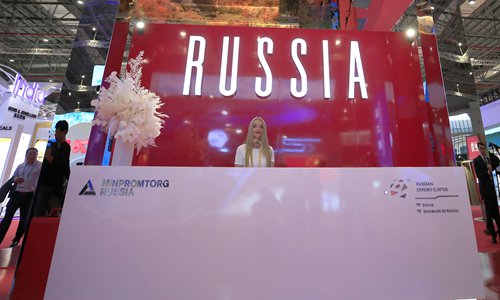
A view of Russia's national pavilion on Tuesday during the second China International Import Expo Photo: Yang Hui/GT

In an effort to diversify export products and nurture new growth points in bilateral economic relations, Russian companies have brought increased quantities of industrial and agricultural products, including soybeans, sugar, ice cream and equipment, to the second China International Import Expo (CIIE).
Exhibitors believe that the trade fair can provide a platform for Russian firms to quickly establish reputations and bridges with Chinese importers. As bilateral economic and political ties inch closer, the two nations are on a fast track to reaching their target of hitting $200 billion in trade turnover by 2024.
This year marks Russia's second participation as a guest of honor in the exhibition. The Global Times learned that more than 100 Russian companies have attended the second CIIE, with 43 being agricultural in nature and occupying about 1,000 square meters of exhibition areas. Products on display include honey, meat, dairy products, nuts and beverages.
At the Russian National Pavilion, companies from other industries in such as manufacturing, auto and aviation have showcased their cutting-edged products, including a nuclear-powered icebreaker, robotics, the MC-21-300 passenger aircraft and a model Senat from luxury car brand Aurus.
About 20 percent of Russian exhibitors are participating in the fair for a second time. It is expected that Russian exhibitors will host 500 business-to-business meetings with potential Chinese partners.
Ekaterina Kiseleva, an employee from Northern Chai which sells organic herbal food and drinks, told the Global Times on Wednesday that the company has received inquiries from several Chinese trade agencies that are interested in importing their products, but they are still negotiating the details.
"This is the first time we [have participated], and we hope to make Chinese consumers aware of our brand through the fair," Kiseleva said.
An employee from aviation-parts-maker All-Russian Scientific Research Institute of Aviation Materials told the Global Times that their main purpose of participating in the second CIIE is to make "Chinese makers aware of us and build a reputation."
While in the past, trade relations between China and Russia were mainly concentrated in the traditional energy sector including oil and natural gas, exhibitors noted that the fair had opened a door to drive new growth in the bilateral trade of non-energy sectors. This could in turn push forward the timeframe to reach the bilateral trade volume target of $200 million by 2024.
Vladimir Khritankov, manager of a Russian trading company, told the Global Times that the Russian government has removed all barriers that may restrict bilateral cooperation in order to expand bilateral trade. "All conditions are well positioned and just in need of efforts."
Xiao Bin, an associate research fellow at the Chinese Academy of Social Sciences' Institute of Russian, Eastern European and Central Asian Studies, noted that Russia's proximity to China and the complementary nature of the two countries' products will make Russian imports more competitive in the Chinese market.
China has been the largest trading partner of Russia for nine consecutive years. Last year, the bilateral trade volume rose above $100 billion, with Russia's non-energy exports to China growing 7 percent to $12 billion. In the first half of 2019, such exports rose 9 percent.
"Russia is also ramping up efforts to diversify export structure to reduce reliance on energy exports amid fluctuations in global oil prices. Participating in the CIIE will also benefit Russia and help them access more foreign exchanges to support economic development," Xiao told the Global Times.
In June, China and Russia upgraded their relations to a comprehensive strategic partnership of coordination for a new era, highlighting the bright prospects for bilateral cooperation based on solid political relations.
Alexey Gruzdev, Deputy Minister of Industry and Trade, said at the opening ceremony of the Russian National Pavilion on Tuesday that industrial cooperation such as that in the aviation arena could be the next breaking point to bring bilateral economic relations to the next level.
Last year, the Russian delegation signed roughly 500 agreements totaling $350 million with Chinese partners.
Newspaper headline: Russia brings more products to trade fair
Contact: Ms. Chen
Phone: 13799290896
Tel: 13799290896
Email: 326488291@qq.com
Add: